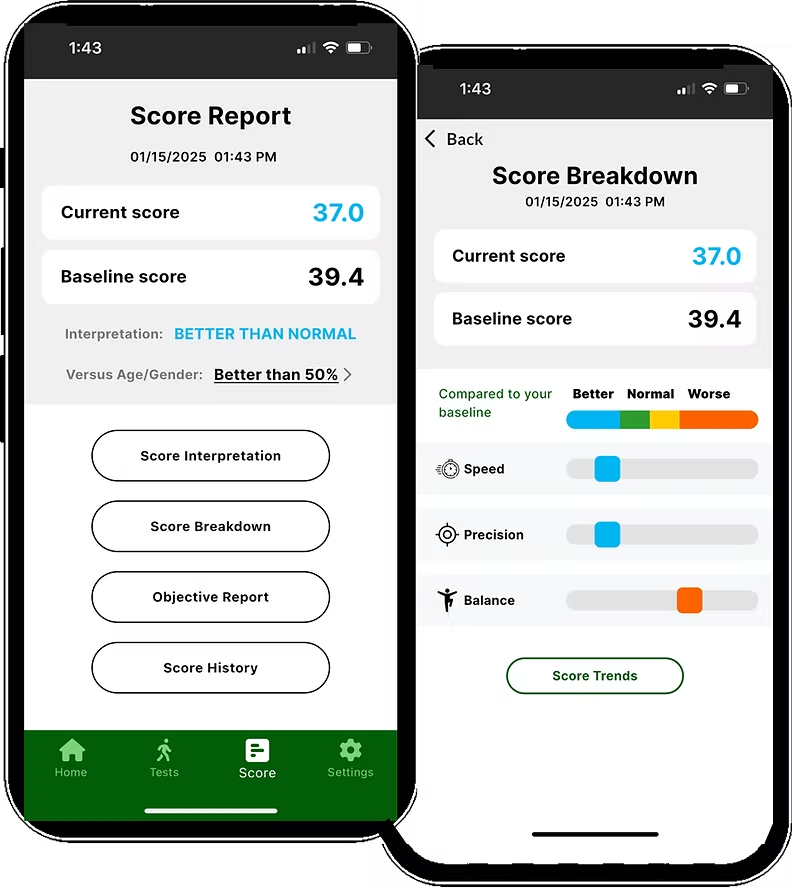Investigators:
Michael Milburn and William DeJong, Impairment Science, Inc.
Anuj Pradhan and Shannon Roberts, UMass Amherst
MassAITC Cohort: Year 2 (Aging)

Project Accomplishments: The pilot project conducted by Impairment Science, Inc. and the University of Massachusetts-Amherst aimed to validate the DRUID® impairment assessment app for senior adults aged 64–85 by comparing its results with performance in a high-fidelity driving simulator. DRUID measures cognitive and motor functioning through tasks assessing reaction time, decision-making, balance, and divided attention, producing an impairment score between 25 and 75. The study recruited 40 participants from local communities, screened them for eligibility, and had them complete baseline DRUID tests before engaging in simulator scenarios designed to replicate real-world driving challenges. The central goal was to determine whether DRUID scores could predict driving errors and performance outcomes among older drivers, thereby supporting its potential use as a practical tool for assessing impairment in this population.
The driving simulator sessions incorporated eleven short scenarios, ranging from highway merging and tailgating to complex left-turn maneuvers, while collecting kinematic, behavioral, and eye-tracking data. This design minimized simulator sickness while capturing detailed measures of visual attention, hazard perception, and vehicle control. Preliminary analyses suggested that DRUID baseline scores could predict certain driving outcomes, though further statistical work is planned to refine these findings. The project demonstrated the feasibility of using DRUID with older adults and highlighted its potential to enhance safety, health, and quality of life by providing a reliable, easy-to-use impairment assessment tool.
Initial Proposal Abstract: The Druid app was designed to measure cognitive and physical impairment from a variety of sources (e.g., prescription drugs, sleep deprivation/exhaustion, alcohol use, etc.). Druid uses multiple Divided Attention Tasks (DATs) that measure cognitive-motor behaviors including reaction time, decision making, hand-eye coordination, time estimation and balance. The Druid tasks enables measurement of the level of impairment of abilities identified as critical to driving.
This project aims to validate the Druid app for use by adults aged 64-85 years who may be experiencing declines in cognitive-motor performance due to normal aging. We will compare assessments provided by the Druid impairment to senior adults’ performance on the UMass/Amherst Human Performance Lab’s Realtime Technology driving simulator. We propose to validate both the 3-minute and 70-second Druid apps against Realtime Technology’s full-scale cab driving simulator which records multiple aspects of driving performance, including but not limited to longitudinal and lateral velocity, braking force, reaction time, and driving errors.
We anticipate that Druid can ascertain marked declines in cognitive and motor performance indicating that a senior adult should not drive on a particular occasion, no longer drive altogether, or should obtain a medical evaluation or be tested on a driving simulator to make that determination. Because senior adults’ cognitive and motor functioning can vary day to day, having a reliable, valid, and easy-to-use tool like Druid will contribute significantly to senior adults’ health, safety, and quality of life.
Outcomes:
- Poster Presentation: a2 National Symposium 2024
 Title: Utilizing the Druid Impairment App to Assess and Enhance Senior Adults’ Driving Performance Authors: Michael Kilburn, William DeJong, Anuj Pradhan, Apoorva Hungund, Melissa Paciulli
Title: Utilizing the Druid Impairment App to Assess and Enhance Senior Adults’ Driving Performance Authors: Michael Kilburn, William DeJong, Anuj Pradhan, Apoorva Hungund, Melissa Paciulli - New Product Launch: Druid Benchmark App
 New versions of the Druid Benchmark app are made on a continuous basis. Improvements made since the project started on August 16, 2023, include changes to the user interface, modifications in how the impairment scores are presented and interpreted for the user, and anti-cheating measures. Source: https://apps.apple.com/us/app/druidapp/id1107595146
New versions of the Druid Benchmark app are made on a continuous basis. Improvements made since the project started on August 16, 2023, include changes to the user interface, modifications in how the impairment scores are presented and interpreted for the user, and anti-cheating measures. Source: https://apps.apple.com/us/app/druidapp/id1107595146
